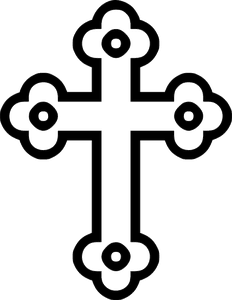Our Beliefs
Our Statement of Faith - The Nicene-Constantinopolitan Creed (A.D. 381)
God The Father
Original Greek:
Πιστεύομεν εἰς ἕνα Θεόν, Πατέρα, Παντοκράτορα, ποιητὴν οὐρανοῦ καὶ γῆς, ὁρατῶν τε πάντων καὶ ἀοράτων.
English Translation:
We believe in one God, the Father Almighty, Maker of heaven and earth, and of all things visible and invisible;
God The Son
Original Greek:
Καὶ εἰς ἕνα Κύριον Ἰησοῦν Χριστόν, τὸν Υἱὸν τοῦ Θεοῦ τὸν μονογενῆ,
τὸν ἐκ τοῦ Πατρὸς γεννηθέντα πρὸ πάντων τῶν αἰώνων·
φῶς ἐκ φωτός, Θεὸν ἀληθινὸν ἐκ Θεοῦ ἀληθινοῦ, γεννηθέντα οὐ ποιηθέντα,
ὁμοούσιον τῷ Πατρί, δι οὗ τὰ πάντα ἐγένετο.
Τὸν δι ἡμᾶς τοὺς ἀνθρώπους καὶ διὰ τὴν ἡμετέραν σωτηρίαν κατελθόντα ἐκ τῶν οὐρανῶν
καὶ σαρκωθέντα ἐκ Πνεύματος Ἁγίου καὶ Μαρίας τῆς Παρθένου καὶ ἐνανθρωπήσαντα.
Σταυρωθέντα τε ὑπὲρ ἡμῶν ἐπὶ Ποντίου Πιλάτου, καὶ παθόντα καὶ ταφέντα.
Καὶ ἀναστάντα τῇ τρίτῃ ἡμέρα κατὰ τὰς Γραφάς.
Καὶ ἀνελθόντα εἰς τοὺς οὐρανοὺς καὶ καθεζόμενον ἐκ δεξιῶν τοῦ Πατρός.
Καὶ πάλιν ἐρχόμενον μετὰ δόξης κρῖναι ζῶντας καὶ νεκρούς, οὗ τῆς βασιλείας οὐκ ἔσται τέλος.
English Translation:
And in one Lord Jesus Christ, the Son of God, the Only-begotten,
Begotten of the Father before all ages,
Light of Light, Very God of Very God, Begotten, not made;
of one essence with the Father; by whom all things were made:
Who for us men and for our salvation came down from heaven,
and was incarnate of the Holy Spirit and the Virgin Mary, and was made man;
And was crucified also for us under Pontius Pilate, and suffered and was buried;
And the third day He rose again, according to the Scriptures;
And ascended into heaven, and sits at the right hand of the Father;
And He shall come again with glory to judge the living and the dead, Whose kingdom shall have no end.
God The Holy Spirit
Original Greek:
Καὶ εἰς τὸ Πνεῦμα τὸ Ἅγιον, τὸ κύριον, τὸ ζωοποιόν,
τὸ ἐκ τοῦ Πατρὸς ἐκπορευόμενον,
τὸ σὺν Πατρὶ καὶ Υἱῷ συμπροσκυνούμενον καὶ συνδοξαζόμενον,
τὸ λαλῆσαν διὰ τῶν προφητῶν.
English Translation:
And we believe in the Holy Spirit, the Lord, and Giver of Life,
Who proceeds from the Father,
Who with the Father and the Son together is worshipped and glorified,
Who spoke by the Prophets;
The Church And Our Salvation
Original Greek:
Εἰς Μίαν, Ἁγίαν, Καθολικὴν καὶ Ἀποστολικὴν Ἐκκλησίαν.
Ὁμολογῶ ἓν βάπτισμα εἰς ἄφεσιν ἁμαρτιῶν.
Προσδοκῶ ἀνάστασιν νεκρῶν.
Καὶ ζωὴν τοῦ μέλλοντος αἰῶνος. Ἀμήν.
English Translation:
And we believe in One, Holy, Catholic, and Apostolic Church.
We acknowledge one Baptism for the remission of sins.
We look for the Resurrection of the dead,
And the Life of the age to come. Amen.
Ancestral Sin And Our Reconciliation In Jesus Christ
If Orthodoxy had to pick to a single word to summarize our Christian reality, one of the top contenders would be the word "relationship." In Genesis, God tells us that we were created in His image and according to His likeness. Adam and Eve walked with God in perfect relationship with Him.
Then, Adam sinned, and severely damaged that relationship, and distorted the likeness of God he was formed to be. In Adam, sin has separated humanity from God and His purpose for our lives, which is to live in communion with Him and obedience to Him. After the fall of Adam, humanity's situation became that of a fractured relationship with God. God gave His people Mosaic Law, and began rebuilding that relationship with an incrementally unfolding revelation about Himself and what humanity had lost. This eventually culminated with God taking humanity into His divinity. Through the totality of Christ's works (His incarnation, sinless life, miracles, teaching His disciples Apostolic Tradition, His death on the Cross, descent into and harrowing of Hades, His glorious resurrection, ascension, and Christ's sending His Father's Holy Spirit to dwell in us), we are able to have our relationship with God restored. But the restoration is greater than the original creation, for Adam and Eve did not have God's Holy Spirit indwelling them, they were unable to partake in the Body and Blood of Christ - but we are now given that possibility! (You can learn more about that process as an Inquirer in our Catechism classes.) The goal of every Orthodox is to seek this relationship which is beyond re-established, but is now re-created anew in Christ Jesus (2 Cor. 5:17). Like the Prodigal Son realizing we have squandered our inheritance, we return back to our Father seeking only to be in His presence as His servants, and are instead given God's ring on our finger and are clothed in His finest robes.
Scripture contains many analogies of salvation. We do not choose one and avoid all others as the West tends to do, but rather we embrace them all as metaphors for the mystery of salvation. We believe two of the most moving and poignant are not the juridical ones the West concentrates on, but rather that of Christ the Great Physician healing us of and restoring us from the brokenness of our separation from God, and that of the unconditionally loving Father rushing towards His returning prodigal with joyful, open arms. Thus for the Christian East, salvation is far more than some mere legalistic point-in-time accounting transaction as in the West. It is instead an eternal process of being made into Christ's likeness and being brought into an ever-increasing loving conformity with God's will. The most important moment in all of eternity is now - however, "now" isn't a single moment but a stream of all moments, the "eternal present" which is the only place we can have a relationship with our God and our neighbors.
Fr. Andrew Stephen Damick has written "[I]t’s worth noting how the Orthodox understand how salvation proceeds with regard to time. There is of course a sense in which salvation can be put in the past tense, i.e., “I am saved,” because Christ’s redemption of human nature on the cross is a done deal. And there is also the sense in which I have “put on Christ” in baptism (Gal. 3:27), which does indeed save (1 Pet. 3:21). But for the Orthodox, salvation is also in the present tense (“I am being saved,” cf. 1 Cor. 1:18, 2 Cor. 2:15, Phil. 2:12-13, etc.); it is an ongoing process. And there is also a sense in which salvation is something that is not yet complete (“I will be saved,” cf. Matt. 10:22, Rom. 8:23-25, Rom. 11:22, etc. — lots more here)." [https://blogs.AncientFaith.com/OrthodoxyAndHeterodoxy/2018/03/15/]
In answer to the question "Are you saved?" Metropolitan Kallistos Ware said in his lecture on salvation, "I have been saved, I am being saved, and by God's grace, I will be saved." [https://www.youtube.com/watch?v=3F7h-TStNd8]
Holy Scripture
We unquestioningly believe that the Bible is God’s Word. All of Holy Scripture is therefore inerrant. This does not, however, mean that it cannot be grossly misinterpreted and wildly abused (think of the Protestant sect of the Branch Davidians and David Koresh). Satan quoted Scripture to Christ, but misinterpreted it. In these and many other similar instances Scripture was not wrong - its interpretation was.
Proper interpretation of the New Testament requires interpreting it in light of all other Scripture in both the Old and New Testaments, as well as the oral teachings of the Apostles (preserved in Patristic writings as well as continued oral instruction). These are of course the very same Apostles who wrote the Scripture books in the first place, that in the late 3rd Century would be Canonized as the New Testament. The Greek word "kanon" originally referred to a very straight reed - it was used like a yardstick to measure straightness, not distance. The Canon or measuring reed that was used to Canonize (or certify as being straight) the New Testament was the Apostolic Tradition which Christ taught the Apostles and they taught the Church. As Paul, Silas and Timothy wrote in the 2nd Letter to the Christians in Thessalonika "So then, brethren, stand firm and hold to the traditions which you were taught, whether by word of mouth or by letter from us." (2 Thess 2:15) The verbal traditions of the Apostles - taught by "word of mouth", the teaching and preaching the Apostles did when the founded the various Churches - are according to Scripture every bit as binding as the writings of the same Apostles which would eventually become the New Testament Scriptures. These Apostolic Traditions are preserved for us in the Liturgies, Patristic and similar extra-Biblical writings, and the consensus of the Church Fathers expressed in the Seven Ecumenical Councils.
The One, Holy, Catholic and Apostolic Church
When Christ ascended into Heaven, He did not leave us with the New Testament. It simply had not been written - it didn't exist yet. Many American Christians simply have not contemplated this historically provable and unassailable fact. The complete list of the books of the New Testament were not canonized - officially recognized - until the late 4th Century.
Christ did not leave us with the New Testament, He left us with something far greater. He left us with His Church. Forty days after His Ascension, Christ sent His Father's Holy Spirit to His Apostles on the Jewish holiday of Pentecost. On that day, Christ's Church on Earth was established. Around 250 years later, the same general time that the New Testament Canon was being recognized. the Second Ecumenical Council held in Constantinople stated "And we believe in one, holy, catholic, and apostolic Church." The New Testament calls this Church "the body of Christ." It is the Church founded by the Apostles, continued through Apostolic Succession, that kept alive and pure the oral traditions specified in the New Testament which are our guide in interpreting those same Scriptures that the Church gave us through the Apostles. Thus Apostolic Tradition is not separate from Scripture, but rather, Scripture is a subset of Apostolic Tradition. Of course, we hold Scriptures to be the pinnacle of Apostolic Tradition, and the words of Jesus recorded in the New Testament have the highest authority of all of Apostolic Tradition.
The Apostolic Church is thus understood as the creator and repository of all Apostolic Tradition. The Apostolic Church, through the writings of the Apostles, gave us Scripture.
Still Have Questions?
We invite you to attend Divine Liturgy on Sunday, join us in adoration of the Holy Trinity, and experience the reality of God's presence. Afterwards in the Agape Meal (which we commonly call Coffee Hour), we have many people who would love to talk with you about our faith and answer any questions you may have. We also offer Catechism class, which you can join as an Inquirer (no commitments). You can also contact us directly by clicking the button below.


